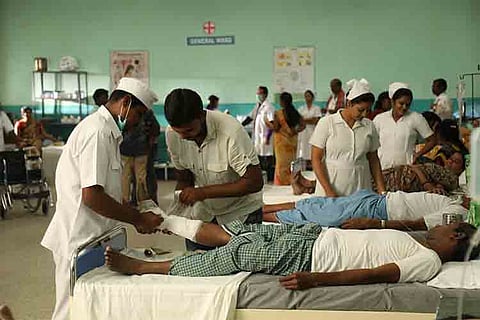

At Sree Chitra Tirunal Institute of Medical Sciences and Technology (SCTIMST) in Thiruvananthapuram district of Kerala, protests are mounting against its new regulations to get subsidised treatment for financially poor. The institute's decision to limit the consultations as part of crowd management in the Outpatient Department (OPD) has also caused trouble to several patients.
A hospital and research centre, SCTIMST is known as one of the best cardiology and neurology treatment centers in the country. The institute, which is an Institute of National Importance under the Indian government, has been giving free or subsidised treatment to financially poor patients ever since its establishment in 1979. The institute is running on the 50% grant given by the central government and the rest of the revenue is sourced from resources of the institute. Citing financial restraints, on December 1, the institute implemented new regulations or conditions in providing subsidised treatments.
As part of implementing the central government's Ayushman Bharat scheme (or National Health Protection Scheme), the institute published a revised Socio-Economic Assessment Sheet (SEAS) for subsidised treatment. It specifies nine parameters to qualify for subsidised treatment: Land ownership, a house, a toilet in the house, a colour television and an illiterate person in house, drinking water supply, a non-regular employed person in the house, a woman-headed house, an SC/ST person with no regular employment and the presence of a severely sick person (or persons with disabilities) in the house. Of these nine parameters, the patient has to fulfil at least seven.
Incidentally, the management of the institute has taken into consideration the nine criteria laid down by the Kerala government when issuing ration cards to families below poverty line (BPL).
According to DR Anil, Sree Chitra Institute protection council convenor, the hospital classified patients into three categories. 'A' category offered free treatment to patients below poverty line (BPL). Under 'B' category, patients would get 30 percent subsidy, considering their financial status. 'D' category offered no subsidy.
“Now, they have limited the subsidised treatment to just two categories, that is, A and D. Considering the new criteria, a majority of the patients in Kerala will not be eligible for subsidy. Even if a patient meets all criteria, the institute's Vigilance Cell will do an inquiry to make sure all certificates produced by the patient are genuine. Imagine what would be the condition of a seriously ill patient after all the verification is complete,” said Anil.
He said that the institute's vigilance team questions each patient to categorise them. “They will ask the patient how he/she got a gold chain, a phone or a new cloth. They ask whether they own a television. How can all these connect to poverty," he asked.
Considering the living standards of families in Kerala, most of them don't come under the given criteria, he added. “There will not be any houses here without a toilet, a television or with an illiterate person as we know Kerala has a good literacy rate. Kerala government provides better living standards to the public but the hospital expenses are a huge burden for a common man here. The poverty criteria cannot be generalised. Sree Chithra Institute was an option for the common man here. This move is going to affect many marginalised people. We will be protesting until the changes are withdrawn,” he said.
However, in an order on the move to revise the categories, issued by the institute management, the medical superintendent claimed that the entire burden of subsidies is being already met by internal revenue and not supported by the government or any other schemes.
The institute’s decision to limit the number of patients in the neurology department per day has also invited criticism. “Consultation of the first patient starts at 9 am. Out of the total number of newly registered patients, the first 20 will be issued passes and allowed entry. The number of review patients in GNR will be limited to 20 patients per consultant and medical records department (MRD) may issue appointments accordingly,” said an order from Kavita Raja, Medical Superintendent.
Speaking to TNM, a person, whose son is under treatment at SCTIMST, said it will be hard for them to continue the treatment without subsidy. “More than 100 patients were consulted daily earlier. Now, they have limited it to 20. Instead of increasing the resources, they are cutting down the facilities. The previous day, a small child and the mother were asked to leave as the daily limit was over. The child had gone through multiple seizures,” he said.
According to a doctor who works at the institute, the move will totally trouble the common people of Kerala. “Patients from outside Kerala were also given priority here,” the doctor said, adding, “Now, the management has taken away subsidies and limited patients in neuro department, which will keep the common people of the state away. A few doctors here are completely against the move as we wish to serve the public to the best of our abilities.”
The move has received criticisms from various political leaders, including Kerala Health Minister KK Shylaja.
Parliament member K Sudhakaran had moved an adjournment motion on December 3 over the issue.
Thiruvananthapuram MP Shashi Tharoor even shot a letter to Dr Harsh Vardhan, Union Minister for Science and Technology. “With effect from December 1, 2019, an individual will only be able to avail the benefits if they meet seven out of nine such criteria, which will be determined based on the documents they submit and subject to additional approval from vigilance department of the institute. Even after this, securing free treatment will be subject to the resource generation of the institute,” he wrote, urging ministers to take remedial steps as the marginalised and disadvantaged sections of society will be affected with this.
Image Credit: Picxy.com/rajastills